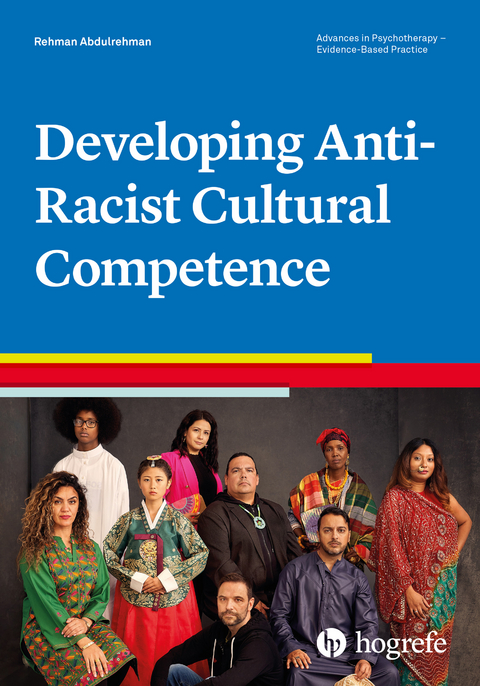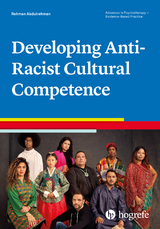Developing Anti-Racist Cultural Competence
Hogrefe Publishing (Verlag)
978-0-88937-515-4 (ISBN)
Teaches cultural humility
Provides practical guidance
Addresses internalized racism
In today's society, anti-racist cultural competence is an essential skill and not something meant only to be addressed by some. Issues tied to resolving racism and understanding and including diverse cultural points of view remain highly conflictual - and the ability to deal with these issues effectively is often hindered by fear, anxiety, and a misunderstanding of what it means to be culturally competent without making people feel like outsiders. While many other models of cultural competence approach the issue as though looking into a fishbowl, this book views the issue as everyone swimming in the water together, as part of a common ecosystem and community.
Abdulrehman provides a direct, no-nonsense, and practical approach to this challenging and complex topic, using real-life examples to help the reader to approach sensitive cultural issues confidently and humbly. He looks in detail at how we can understand our biases and how they impact our engagement and trust with marginalized people of color. The less addressed issues of ethnic and cultural identity development, and understanding internalized racism and how it too can impact cross-cultural engagement are also presented. This book provides a unique perspective that addresses anti-racism and cross-cultural interactions as a process for better understanding how you see the world - a very different process than merely describing how others see the world differently from you. This volume is suitable not only for psychology professionals, but anyone who wants to explore what it means to be anti-racist and culturally competent.
Rehman Abdulrehman, PhD, is a clinical and consulting psychologist whose work has spanned continents and cultures, with a focus on the intersection of mental health; diversity, equity, and inclusion; and leadership. Dr. Abdulrehman has supported many organizations to address diversity, equity, and inclusion including Google/YouTube, Mastercard Foundation, the Canadian Broadcasting Corporation, and the Government of Canada. He has developed and hosted a podcast, Different People, addressing difficult conversations on racism, and the Bias Outside the Box tool, which went viral, to help people begin a conversation with themselves about the biases they hold. Dr. Abdulrehman was also a TEDx speaker with his talk "Resolving Unconscious Bias," and his work has been recognized by the Society of Consulting Psychology for Excellence in Diversity & Inclusion Consulting. He is also an assistant professor with the Department of Clinical Health Psychology at the University of Manitoba and has held three visiting professor positions at Zanzibar University, the State University of Zanzibar, and Muhimbili University of Health and Allied Sciences, due to his development work in Tanzania.
Dedication
Acknowledgments
Foreword by Monnica Williams
1 Description
1.1 Terminology
1.2 Overview
1.2.1. What This Book Is Not
1.2.2 This Is Not a National Geographic
Read
1.3 Culture and Intersectionality
1.4 What to Expect From This Book
2 Definition of Culture
2.1 Pluralism and Cultural Intersectionality
2.2 Cross-Cultural Models
2.3 Target Audience
2.4 Client Centered Models
2.5 How to Get to Know the Other Person
Without Assuming
2.6 Solutions
2.7 Intersecting Identities and Intersecting
Cultures and Your Client
2.8 Social Justice
2.8.1 What Social Justice Has to Do With
Cross-Cultural Competence
2.8.2 Social Justice, Trust, and the
Therapeutic Relationship
3 Bias
3.1 The Perspective of the Therapist
3.2 Bias Defined
3.3 Your Own Worldview and Bias
3.4 Definition of Racism
3.5 Ignorance and Bias
3.6 Bias in Canada and the US
3.7 Examples
3.7.1 Example One
3.7.2 Example Two
3.7.3 Example Three
3.7.4 Example Four
3.7.5 Example Five
3.7.6 Anxiety About Bias
3.7.7 What Happens When We Are Not
Mindful of Bias
3.8 Solutions
3.9 More Examples
3.9.1 Comedians and Cultural Competence
4 The Perspective of the Client
4.1 Assimilation and Cultural Identity
4.2 Internalized Racism and Blaming
Themselves or Their Own Cultures
4.2.1 Example
4.2.2 Example
4.3 Self-Critical Beliefs
4.4 Internalized Racism, Identity Hiding, and
Code Switching
4.5 The Elephant in the Room
4.6 Supporting Human Rights While
Remaining Anti-Racist
4.7 Multiple Contributors to Cultural Identity
4.8 The Challenge
4.9 Cultural Safety
4.10 Cultural Congruence
4.11 Vulnerability
4.12 Politicized Identities and Psychological
Checkpoints
5 A Culturally Sensitive Working Relationship
and Social Justice
5.1 Transference and Countertransference
5.2 The Good Immigrant
5.3 Intercultural-Intracultural Conflict and
Power Imbalances
5.4 Policing Your Own People
5.5 Cultural Humility
5.6 Social Justice Through Decentering
Whiteness
5.7 Social Justice Globally
5.8 Giving Up Power
6 Common Themes
6.1 Tips to Consider
6.1.1 Professionalism and Self-Disclosure
6.2 Collectivism Versus Individualism &
Family Relationships
6.3 Religion
6.4 Gender and Female Empowerment
6.5 The Pressure to Assimilate
6.6 Summary
7 Beyond the Therapy Room
7.1 Friendship Circles and Getting the Inside
Joke
7.2 Allyship / Co-Conspiratorship
7.3 Professional Roles and Boundaries
7.4 The White Savior
7.5 Jane Elliott
7.6 Getting Your Hands Dirty
7.7 Racism in Police Officers
7.8 Conclusion
8 Further Reading
9 References
10 Appendix: Tools and Resources
| Erscheinungsdatum | 30.08.2023 |
|---|---|
| Reihe/Serie | Advances in Psychotherapy - Evidence-Based Practice ; vol. 54 |
| Verlagsort | Toronto |
| Sprache | englisch |
| Maße | 177 x 254 mm |
| Themenwelt | Geisteswissenschaften ► Psychologie ► Klinische Psychologie |
| Medizin / Pharmazie ► Medizinische Fachgebiete ► Psychiatrie / Psychotherapie | |
| Sozialwissenschaften ► Soziologie | |
| ISBN-10 | 0-88937-515-1 / 0889375151 |
| ISBN-13 | 978-0-88937-515-4 / 9780889375154 |
| Zustand | Neuware |
| Haben Sie eine Frage zum Produkt? |
aus dem Bereich




